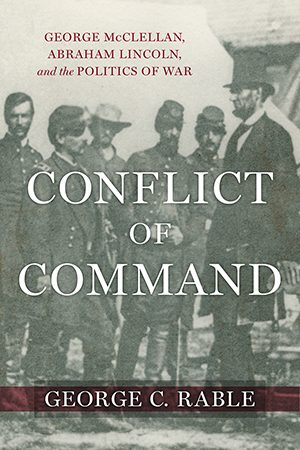
480 pages / 6.00 x 9.00 inches / 5 halftones, 4 maps
Biography & Autobiography / Presidents & Heads Of State | History / Military - Strategy | History / United States - Civil War Period
The fraught relationship between Abraham Lincoln and George McClellan is well known, so much so that many scholars rarely question the standard narrative casting the two as foils, with the Great Emancipator inevitably coming out on top over his supposedly feckless commander. In Conflict of Command, acclaimed Civil War historian George C. Rable rethinks that stance, providing a new understanding of the interaction between the president and his leading wartime general by reinterpreting the political aspects of their partnership.
Rable pays considerable attention to Lincoln’s cabinet, Congress, and newspaper editorials, revealing the role each played in shaping the dealings between the two men. While he surveys McClellan’s military campaigns as commander of the Army of the Potomac, Rable focuses on the political fallout of the fighting rather than the tactical details. This broadly conceived approach highlights the army officers and enlisted men who emerged as citizen-soldiers and political actors.
Most accounts of the Lincoln-McClellan feud solely examine one of the two individuals, and the vast majority adopt a steadfast pro-Lincoln position. Taking a more neutral view, Rable deftly shows how the relationship between the two developed in a political context and ultimately failed spectacularly, profoundly altering the course of the Civil War itself.
George C. Rable is professor emeritus of history at the University of Alabama and the author of numerous books on the Civil War, including Damn Yankees! Demonization and Defiance in the Confederate South.
“George C. Rable has tackled one of the most controversial stories of the Civil War as only a master historian can. Sifting through generations of partisan bickering, he offers a crisp, candid view of the Lincoln-McClellan saga that accomplishes something truly remarkable. It proves fair to both men.”—Zachery A. Fry, author of A Republic in the Ranks: Loyalty and Dissent in the Army of the Potomac
Found an Error? Tell us about it.